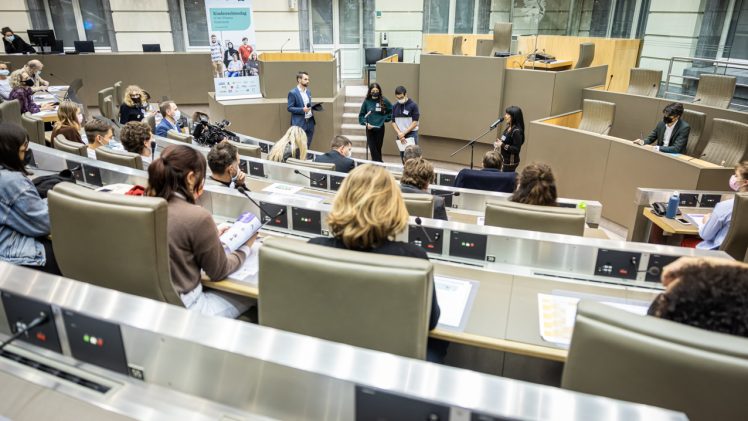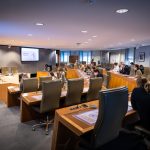evidence
What did we do?
80 young people, divided into 6 different committees on various topics (selected by a group of youth advisors), worked together on drafting resolutions with valuable recommendations during a full day at the Flemish Parliament.
In the afternoon, Flemish Parliamentarians were invited to listen to the young people and discuss the resolutions with them personally. At the end of the day, the resolutions were presented to the committee’s chairs, so they can incorporate this into their work.
When?
Children’s Rights Day: 19 November 2021
Where?
The event took place within the institutions of the Flemish Parliament itself, also the heart of regional politics.
Who was involved?
Children involved: It was the objective of the organisations involved to invite a heterogenous group of young people, without over or under representing one group from society. Invitations for participation were sent to schools as well as to partner organisations working with children in vulnerable situations. On the day of the event itself, a diverse group of schoolchildren from all over the region were present. Representing students from various education backgrounds and social groups.
Adults involved: experts from children’s rights civil society, professional moderators, politicians.
What did we find out about?
There were 6 different committees – according to the different committees existing within the Flemish Parliament. Topics discussed were pre selected by the group of youth advisors. The 6 committees discussed following broader themes: climate, mobility, welfare, free-time, education and equal opportunities.
The young people involved pushed forward a children’s (rights) perspective on the topics daily discussed in the committees. Parliamentarians often mentioned being intrigued by the way the young people approached issues, setting clear priorities.
Many of the young people involved expressed a feeling of satisfaction finally being heard by politicians, and gratitude for having had the opportunity to directly engage with them,– both during the official sessions and informally afterwards.
Here you can find information about the event and a link to the report/resolutions (written in Dutch): Jongeren nemen het Vlaams Parlement even over op Kinderrechtendag (kinderrechtencommissariaat.be).
Here you can watch the ‘Aftermovie’: Jongeren nemen Vlaams Parlement over op Kinderrechtendag: the aftermovie – YouTube
Contact person: Kobe Hautekiet kobe.hautekiet@keki.be / info@keki.be
-
impact
What impact did you want to achieve?
The main goal was to have the parliamentarians listen to the young people. Therefore, professional moderators would guide the sessions with the parliamentarians. Moreover, it was perceived important, and impactful, to have a children’s perspective from the young people themselves being introduced on topics discussed within the committees on a regular basis.What changes did you achieve?
More awareness Review: made the politicians – definitely during the day – reflect on their own work and the perspectives of young people, with quotes often stating that they were surprised by the priorities young people were clearly putting forward. -
advice
Advice on children’s participation:
The children involved are the main actors, meaning all the adults are the spectators. Within committees where parliamentarians are present, it is important to make sure that children have the time and comfortable space to express their opinions, without parliamentarians, who are clearly more experienced, taking the lead during discussion. The event is not about politicians defending their political plans, it is about bringing in a children’s perspective. Important is to plan well in advance, and involve a group of youth advisors on a regular basis. The group of youth advisors participating in this event had input for both the themes discussed as well as the practical planning of the day.Advice on inclusive/increasing impact:
A high degree of involvement of politicians is important, not in the least for the young people themselves, who highly appreciated the opportunity to speak during and after sessions with them. Inviting young people through schools and partner organisations, we received a very diverse group of young people from all over the region, also including young people for whom this was the first experience with participation in the parliament. Frequently involving the ‘youth advisors’ group within the preparatory work also was an important element: to address the needs, the themes of the day…and so on. Participation of the politicians also should not be free of obligations. As organisations it is important to follow up on what will be done with the drafted resolutions of this Children’s Rights Day.




